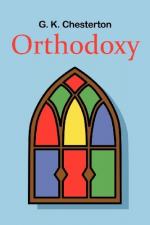
|
| Name: _________________________ | Period: ___________________ |
This test consists of 5 multiple choice questions, 5 short answer questions, and 10 short essay questions.
Multiple Choice Questions
1. What happened as Chesterton put the final touches onto the heresy he had created?
(a) He found that it was orthodoxy.
(b) He found that he no longer believed it.
(c) He found that the heresy was paganism.
(d) He found that the heresy was untenable.
2. What does evolution destroy, according to Chesterton?
(a) Religion.
(b) Reason.
(c) Modern intelligence.
(d) Science.
3. At the beginning of Chapter III, The Suicide of Thought, why does Chesterton say that the modern world is too good?
(a) It is full of wasted virtues.
(b) Its ethics are better than they used to be.
(c) It has little conception of vice.
(d) It deals well with evil.
4. What conclusion does the complete skeptic eventually reach?
(a) No one else can think for him.
(b) He will never find the answers.
(c) There are no answers to be found.
(d) He has no right to think for himself.
5. Chesterton says that this common ground is mostly found among what group of readers?
(a) Well-educated readers.
(b) Readers from Eastern culture.
(c) People who have read a large amount of Christian apologetics.
(d) Readers from Western culture.
Short Answer Questions
1. What is the title of Chapter I?
2. What does Chesterton assert as a necessity for the human mind?
3. What problem, according to Chesterton, is the central issue in the book?
4. Why, according to Chesterton, can a madman never understand simple, careless acts?
5. What does Chesterton say concerning the boundaries of the will?
Short Essay Questions
1. In Chapter IV, The Ethics of Elfland, what does Chesterton give as the first two principles of democracy? How does he convey a sense of wonder even in these principles?
2. Chesterton says that a perfect view of the world combines a searching mind with the feeling of being welcomed. What does this mean? How does it relate to Christianity?
3. Chesterton assumes that he and his reader will share the common ground of agreeing that an interesting, active life is preferable to simple existence. Is this a fair starting point? Why or why not?
4. Materialistic fatalism has been credited with being merciful, though Chesterton says this is far from the truth. Why can fatalism not be merciful?
5. Humility is chiefly understood chiefly as a restraint on a man's arrogance and boasting. What is Chesterton's argument concerning humility? What example does he give to illustrate a humble view of the world?
6. Why does Chesterton claim that fairyland is more rational than the scientific world? Does the sense of wonder remain?
7. What is "the false theory of progress" (Chesterton 2000, pg 196)? What implications does it have for daily life?
8. Chapter II, The Maniac, begins with the idea that man believing in himself is a weakness. Chesterton asserts this in the face of modern thinking, which says believing in oneself is the strongest way to live. What reasons does Chesterton give for asserting this statement?
9. How does Chesterton explain the idea of the madman in life, in experience? How does this person live in the world?
10. Poetry is the only thing that keeps a man sane, while reason drives him insane. How does Chesterton support this argument, and is it plausible?
|
This section contains 1,641 words (approx. 6 pages at 300 words per page) |

|




